Text
Your Friendly Neighbourhood INTP
*when with most people*
“Why are you so quiet”
“Am I making you uncomfortable”
“Speak up more”
“Don’t worry I don’t bite”
“Be more social”
*when with friends*
“Can you maybe shut up for a bit”
“Is this your fact of the day”
“No I will not dare you to do that”
“What the fuck INTP”
“Hoe don’t do it”
“INTP no”
“INTP stop”
“INTP WE ARE IN PUBLIC”
“THIS IS AGAINST COMMON HUMAN DECENCY”
1K notes
·
View notes
Note
I was wondering if you've noticed any links between mbti and mental illness so like anxiety or ASD?
nah nah nah, nah. I mean I don't know of links but I've noticed correlations between things like anxiety and certain types, but correlation doesn't equal causation.
4 notes
·
View notes
Photo
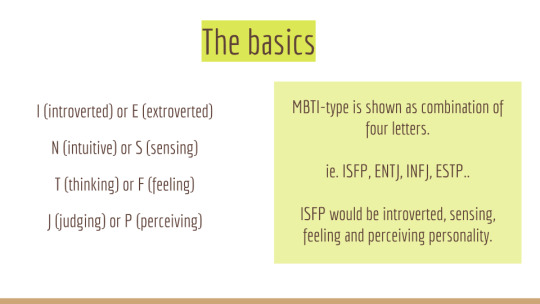


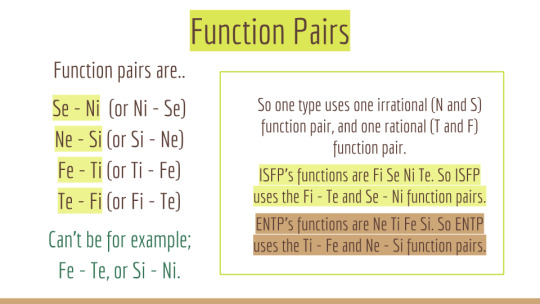

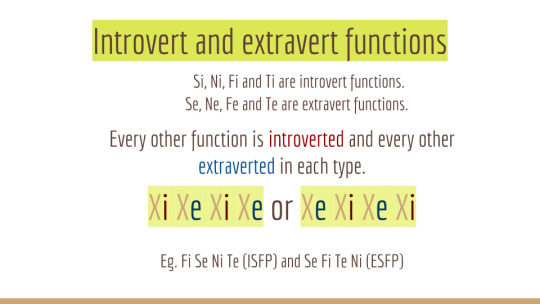
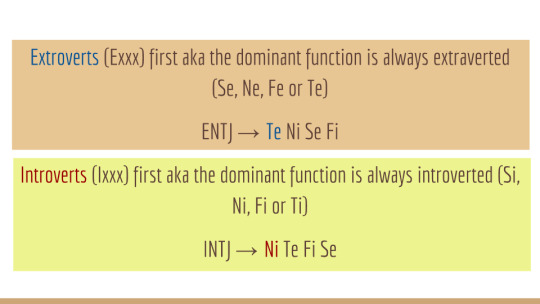

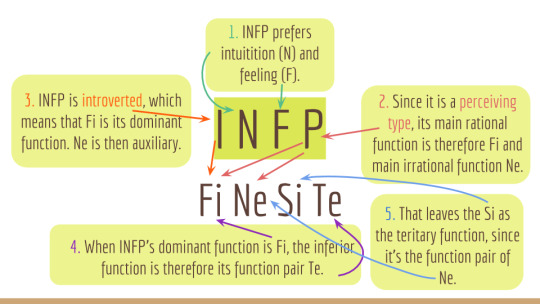

The very basics of cognitive functions. I know it’s super boring and annoying to learn this system, but it’ll drag you deeper in this pseudoscience hell help you a bunch.
INTROVERTED FEELING VS EXTRAVERTED FEELING
INTROVERTED THINKING VS EXTRAVERTED THINKING
6K notes
·
View notes
Photo


mbti moodboards
➥ INTJ (the mastermind)
[INTJs] are introspective, logical, rational, pragmatic, clear-headed, directive, and attentive. As strategists, they are better than any other type at brainstorming approaches to situations. They are capable but not eager leaders, stepping forward only when it becomes obvious to them that they are the best for the job.
Strong-willed and very self-assured, they may make this decision quickly, as they tend to make all decisions. But though they are decisive, they are open to new evidence and new ideas, flexible in their planning to accommodate changing situations. They tend to excel at judging the usefulness of ideas and will apply whatever seems most efficient to them in accomplishing their clearly envisioned goals. (x)
1K notes
·
View notes
Text
INTP-❤️
plz humor me and reblog w/ ur type and your #1 most frequently used emoji
ENTP- 🐩
(I’ll compile them when I’m done)
792 notes
·
View notes
Note
Is Luna Lovegood an INFP or INTP?
I definitely see why people would see her as either, though in my personal experience, Luna acts a lot more like an INTP than INFPs I know in person. I think this could be because I can see her Fe more than Fi; maybe there’s a debate because the Ti and Fi introverted functions (dominant in INTP/INFP) get mixed up, especially bc Luna is a background character we can’t get to know her functions as well as the mains. Her analysation of situations and her way of problem solving seems more like INTP though.
8 notes
·
View notes
Text
Cognitive Functions as Forms of Artistic Expression
SUBMITTED by intj-the-cynical-idealist

Ni: the Novel
Novels focus on symbolism communicated with language. They don’t show you, they describe. Typically a novel is contemplated at length before it is finished. Novels give insight into the creators thought process and unique world view.
Ne: Comic Books
Comic books typically focus on fast paced, zany adventures. The creators have much more freedom than a novelist because consistency is not paramount. The serialized format lets the creator experiment with different ideas and move on issue to issue.
Si: Painting/Drawing
Paintings and drawings often capture images of real things, but the creator may depict them in anyway they choose. After it is complete a painting is a static image, often ending up in a museum for future generations to enjoy.
Se: Film
Video is as close as you can get to conveying raw sensory information. It’s all about the dynamic visual portrayal of a story. Compared to a painting, films show the world objectively.
Fi: Poetry
At its core poetry is emotional. A good poet puts down part of themselves on the paper when the write a poem. Poetry is hard to pin down objectively, and often a poem means different things to different people.
Fe: Live Music
In a sense, a musical performance is community poetry. The artist shares its message with its audience using their actual voice or instrument, not words on paper. While a certain song has specific chords and notes, they can be played on almost any instrument or sang with any voice.
Ti: Kinetic Sculpture
While a regular sculpture has to be accurate in appearance, a kinetic sculpture must have a functioning system behind it in order to be complete. A kinetic sculpture gives insight into basic principles of physics, as presented by the creator.
Te: Sculpture
Sculptures are not functioning objects. They are simply a hard stone representation of the real thing. A sculpture can function as a universal standard, modeling a real thing without actually being that thing.
450 notes
·
View notes
Text
Cool Bonding Activity:
Ask your INTP a yes or no question and watch them compile a research paper on all of the different scenarios the answer could depend upon
2K notes
·
View notes
Conversation
the types as Things
ENFP: drinking ketchup to cope
INFP: Nicholas Sparks' The Notebook
ENTP: Nicholas Sparks' The Notebook on a skateboard
INTP: a single oyster, wrapped in over five thousand feet of embroidered satin, drifting across the fabric of space and time, and making its way towards the event horizon of a super massive black hole
ESFP: crying yourself to sleep
ISFP: crying in general
ESTP: crocodiles, a fuckton of them
ISTP: the inexplicable urge to correct your friend's already correct grammar paired with the uncertainty of death
ESFJ: Using the :) emoticon to hide the sneaking suspicion that everyone close to you has been replaced by something sinister but virtually identical
ISFJ: Latte foam and misanthropy
ESTJ: a pair of rival neighbors crashing their retractable awnings into each other during a rather uncomfortable outdoor luncheon with friends
ISTJ: three correctly aligned printer cartridges in an incorrectly aligned universe
ENFJ: suspicious hand gestures and solar flares
INFJ: a brief summary of someone else's existential grief
ENTJ: fighting against time, gravity, and the frustration of a broken hole puncher
INTJ: screaming into a bowl of clam chowder and your prayers going unanswered
1K notes
·
View notes
Text
MBTI Types as the Eccentric Animals at the Science Centre that I Work at
The falcon that jumps and smiles and follows you from side to side from its cage, because it loves new people and wants to meet you: ENFJ, ESFJ, ESFP
The crow that clings to the side of its cage and never shuts up because you need to listen to it, it has important things to say, HEY COME BACK: ENTJ, ENFP
The bald eagle who obviously believes that you should be undeniably impressed by how great they are. Look at those wings. And those feathers. I know, it’s a lot to take in: ESTJ, ESTP
The owls who follow you with a stink-eye gaze until you leave: ISTJ, INTJ
The vulture who quietly chills and nonchalantly ignores the other animals, and you, and everything else; nothing else exists: ISTP
The fox who is always either asleep, or falling asleep: INFP, ISFP INTP
The turkey who randomly scares the daylights out of you by gobbling way too loudly out of nowhere: ENTP
The ducks who don’t actually belong to the centre, but fly in and sit in the pond because they like being quietly included around the other animals, and the people that come in: INFJ, ISFJ
719 notes
·
View notes
Photo









MBTI MOODBOARD: INTP (the architect)
INTPs pride themselves on their inventiveness and creativity, their unique perspective and vigorous intellect. Usually known as the philosopher, the architect, or the dreamy professor, INTPs have been responsible for many scientific discoveries throughout history.
559 notes
·
View notes
Conversation
Me, an INTJ: *is nice and expresses feelings*
tumblr: you aRE NOT AN INTJ IF YOU ARE NOT A BLOCK OF ICE 24/7 JESUS GOD YOU IGNORANT POSER OF PSYCHOLOGY THE TESTS ARE ALWAYS INACCURATE YOU DID NOT GET THE CORRECT RESULT HOW BOUT YOU STUDY THE COGNITIVE FUNCTIONS YOU F UC KIN G T OO L
1K notes
·
View notes
Text
What causes/relieves stress: NF types
What stresses out an ENFJ:
Being in critical or confrontational environments
Lack of appreciation or affirmation
Lack of harmony
Unexpected change
Inadequate time to complete work to their standards
Tense relationships or environments
Having to do mundane, repetitive tasks
Having to conform with something that goes against their values
Over-empathizing with others to the point of losing track of their own needs
Being misunderstood or not trusted
People not living up to their idealized expectations
When an ENFJ experiences stress, they often disassociate themselves from the situation in an effort to protect their sense of well-being and togetherness. They may repress the unpleasant side of life for so long, that it gradually intensifies until the ENFJ explodes with emotion and/or charged anger. Often the ENFJ’s body will reflect pent-up stress by manifesting various physical symptoms, like headaches, shoulder tension or an upset stomach. In the case of chronic stress, the ENFJ may fall into the grip of their inferior function, introverted thinking. When this happens, the ENFJ may uncharacteristically lash out at others, obsess over their mistakes, lack of competence and flaws. Eventually, these criticisms will turn inward and the ENFJ will withdraw from others to self-criticize. He or she may become obsessive about analyzing irrelevant data to find some ultimate truth or reason for their stress.
How to help an ENFJ experiencing stress:
Acknowledge how they feel.
Let them talk it out.
Remind them of their strengths and contributions.
Don’t use logic to talk them out of their stress.
Don’t ignore them, even if they seem irrational.
Give them a change of scenery to get away from the situation.
Go outdoors. Do some type of exercise with them.
Watch a lighthearted movie or comedy with them.
Do not patronize or dismiss their concerns.
What stresses out an INFJ:
Having to focus too much on sensory/concrete details
An overload of sensory stimulation or noise
Interruptions
Distress within a close relationship
Having their values violated
Not enough alone time. Too much extraverting.
Working with closed-minded people
Lack of appreciation or understanding
Unfamiliar environments with overwhelming amounts of details
Having plans disrupted
Not having a clear direction
Lack of harmony
Criticism and conflict
Not being able to use their intuition or envision the future
Having to focus too much on the present
When under stress, the INFJ feels fragmented or lost. They feel like they can’t be themselves, and feel an urge to act a part to “survive” or fit in. This disassociation can cause physical symptoms for the INFJ, like headaches, IBS, or nausea. The repressed feelings they’re holding onto can cause them to become immobilized. If they are under chronic extreme stress, they may fall into the grip of their inferior function, extraverted sensing. When this happens, they may engage in indulgent, self-destructive habits like binge-eating, cutting, over-exercising, alcoholism, or excessive pornography use. This often feels like an out-of-body experience to them. What they do provides no pleasure, but feels somewhat robotic and out of control. After this occurs, they dwell in self-hatred, falling even more into guilt over what they’ve done. They may become uncharacteristically angry and quick-tempered, unreasonable, and irrational. They may become obsessed with details in their outer world; obsessively cleaning or doing housework. They stumble over their words, and their intense feelings eventually lead them to a state of complete exhaustion.
How to help an INFJ experiencing stress:
Give them space.
Reduce sensory stimulation; music, interruptions, TV, etc,..
Let them express their thoughts and feelings.
Understand that they may be irrational. Don’t judge them.
Don’t give advice. This will only stress them out further.
Let them take a break from some of their responsibilities
Encourage them to spend some time in nature, walking or reading a book.
Take a walk with them if they want company.
Encourage their less serious side, and let them relieve emotional tension by letting them cry through a sappy movie or novel of some sort.
Be forgiving if they’ve been overly harsh or critical while under stress. Chances are, they will feel very guilty about it.
What stresses out an ENFP:
Environments where rules are rigidly enforced
Focusing on repetitive, detailed tasks
Having to focus too much on sensory details
Having to focus too much on the past or present
Not being able to use their intuition
Constraints on brainstorming or envisioning
A lack of outside stimulation
Being micromanaged
Having creativity stifled
Having to complete projects before they’re ready
Criticism
Lack of appreciation
Having their values violated
Overextending themselves for others
ENFPs tend to overextend themselves, and procrastinate, which is often a source of stress as it complicates their lives. When they become stressed, their naturally charming natures become more irritable and over-sensitive. When stressed, ENFPs feel alienated and engage in deceptions to obscure what is occurring within themselves. They will feel that they are losing control over their own independent identities and feel conflicted by intruding circumstances. During continued stress, they may fall into the grip of their inferior function, introverted thinking. When this happens, they become obsessive and depressed. They will become hyper-aware of minor bodily sensations or abnormalities and interpret them as a sign of a serious illness. They may have a hard time communicating clearly, and feel numb and frozen inside. Their thinking may become cloudy and convoluted. They will feel that there are no possibilities or ways out. They may feel overwhelmed, out of control, unable to sort out priorities, and thus become inflexible. Some become obsessive about record keeping, cleaning, or other household tasks.
How to help an ENFP with stress:
Give them space and time alone to sort out their feelings.
Remind them that they are able and competent.
Give them permission to “escape”.
Don’t give them advice. It won’t help right now.
Don’t ask for details.
Don’t try to “fix” the problem.
Meditation often helps ENFPs.
Listen to them.
Encourage them to exercise.
Encourage them to get enough sleep.
Encourage them to get a massage.
Be warm and kind in the way you speak to them.
After they’ve calmed down a little, ask them if they want help evaluating the situation.
What stresses out an INFP:
Rigidity in rules and timelines
Having values violated
Not enough time alone. Too much extraverting.
Too many demands on their time
Small-talk
A lack of authenticity from others
Having their creativity stifled
Having to focus too extensively on sensory/concrete details
Criticism or confrontation
Fear that they might lose someone or something (relationship/task, etc,..)
When under stress, an INFP gets lost in internal turmoil. They feel caught between pleasing others and maintaining their own integrity and taking care of their well-being. Their natural tendency to identify with others, compounded with their self-sacrificial tendencies, leaves them confused about who they really are. They feel lost and perplexed during stressful times; and as stress builds they can fall into the grip of their inferior function, extraverted thinking. When this happens, they will do things that are typically out of character. They may become obsessed with fixing perceived problems, and righting wrongs. They may blurt out hostile thoughts or engage in destructive fantasies directed at just about anyone available. They also may have biting sarcasm and cynicism. They may become aggressively critical to others and themselves, dwelling on all the “facts” necessary to support their overwhelming sense of failure.
How to help an INFP experiencing stress:
Give them space and time alone to sort out their feelings.
Validate their feelings.
Remind them of their strengths.
Don’t give them advice. This will only make them feel worse.
Let them “get away” from it all.
Exercise can help. However, with these types it’s best not to suggest it when they are stressed, but after, as a solution.
Forgive them if they’ve been overly critical while stressed.
Let them work on a project they’ve been interested in, but maybe have been too busy to spend time on.
x
4K notes
·
View notes
Text
MBTI ASK MEME
Red: What’s your MBTI type?
Yellow: Have you ever typed family/friends? What are their types?
Green: What is the thing you love most about your type?
Brown: What do you hate most about your type?
Scarlet: What stereotypes about your type are true?
Black: What stereotypes about your type are wrong?
Ochre: Have you ever met someone of the same type? What was your relationship like?
Peach: When did you first start identifying as your MBTI type? How did you figure it out?
Ruby: Would you change your type if you could?
Olive: Advice you’d give to a younger person of your type?
Violet: Which characters do you type in the same type as yourself?
Fawn: What do you think contributed to developing your type?
Cream: What form of MBTI do you use most (Jungian psych/cognitive theory, myers-briggs, etc)?
Crimson: Which types do you get along best with?
Silver: Which types do you get along worst with?
Gold: Are there any types you tend to admire?
Azure: Do you ever talk about MBTI outside forums/blogs/etc geared towards it?
Lemon: Which cognitive function (non dom/aux) do you wish you had better control of?
Russet: Do you ever mix psychology or personality tests, like the Enneagram or horoscopes?
Grey: Are there any other types you think you might have developed into when you were younger?
Purple: How is your relationship with your auxiliary and tertiary functions?
White: What function are you currently developing?
Pink: What color do you associate with your type?
Orange: Favorite MBTI blog?
Blue: What is your relationship with your inferior function?
Ivy: What do you think of shadow functions?
2K notes
·
View notes
Conversation
Myers-Briggs Types Shower Headcanons
ISTJ: Showers just as long as they need to. Uses store-brand 2-in-1 shampoo and conditioner. Everything has its place in the shower.
INTJ: Uses very hot water. How do they survive. Tell me your secrets
INFJ: Stands on drain and watches water pool around their feet. Takes two-hour showers. Thinks about the meaning of their existence as the steam builds.
ISFJ: Has a gazillion Bath and Body Works products. Sings and dances to Vocaloid and Disney songs that they play on a little speaker.
ESTJ: ALWAYS asks everyone else in the house if they need to use the bathroom first. You BETTER NOT need it when I'm in the middle of my shower. Don't come in. It's mine now. Bye.
ENTJ: They are ethereal beings who do not need to shower. Showers do not fit into their schedule. They probably shed their skin like a snake or some shit.
ENFJ: Uses bar soap. Prefers baths but never has time for them. Is the nice guy who always cleans out the drain.
ESFJ: Night showers. Stands in there for twenty minutes and then forgets to actually put on soap in the first place.
ESFP: Listens to electronic music while showering. Very hot water. Doodles in the mirror-fog.
ESTP: Shaves without shaving cream, just the razor, so hardcore. Flirts with themselves in the mirror while waiting for water to warm up. Slips a lot in the shower.
ENFP: Makes up songs as they shower, but always forgets to write them down later. Faces the water stream while showering. Night showers.
ENTP: Either takes 5 showers a day or forgets to shower for a week. Talks to themselves. Brushes teeth in the shower.
INTP: Enjoys listening to the water running. Once tried to read while showering. Uses showers as a coping mechanism for stress.
INFP: Did not shower for six weeks after seeing Psycho. You know, for safe measures. Now that they shower, they sing anime theme songs and face the stream of water.
ISTP: Always locks the bathroom door when going into the shower, even if they're alone. Nobody knows why. Uses a washcloth.
ISFP: Showers in the middle of the day. Showers with back against the stream of water. Hums while showering.
2K notes
·
View notes
